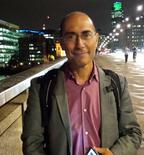James Berger
Sign up for office hours here.
I teach courses on apocalyptic literature and film, utopias and dystopias, historical fiction, disability studies, animal studies, and the status (past/present/[future?]) of the Humanities.
At present, I’m engaged in two research projects. First, I’m trying to understand what are the forces impeding our ability to imagine a future that is just and sustainable–not just to achieve such a future, but even to imagine it. “All that is now proved was once only imagined,” wrote William Blake. What then are the impasses of our imagination? This will be a study of speculation, markets, and risk analysis; a study of climate science, climate politics, climate fiction and climate denial; a study of human psycho-social-ideological adaptation and the question posed by the philosophers Julian Savelescu and Ingmar Perrson, are we “unfit for the future”? Do we require genetic improvements, assistance from AI, intervention from aliens, better union organizers, or simply a new religion? As need requires, I study zombies, the necrological limit case of the unlivable future. All this will, I hope, culminate in a book entitled “The Book of Impasses.”
Second, I am trying to figure out a method for writing about poetry. Is there some true way to respond to and engage with a poem that is not just writing another poem? I don’t want to write scholarship. I love reading literary history, but I don’t want to write literary history. I don’t want to “review” the poem. (Re-View? View it again? How do you view it for the first time?). I want to conjure some way to witness a poem, to be in some “unmediated” (?!) relation to the poem. Surely that cannot be done. So, how can I do it?! Following Schiller, I want to write a “Naive and Sentimental Poetics.” (!).
I figure this will keep me busy for a while.
Books
The Obvious Poems and The Worthless Poems (poems). Brooklyn: Spuyten Duyvil Press, 2022.
Under the Impression (poems). Buffalo: BlazeVox, 2020.
The OBU Manifestos, vol. 2. Toronto and Brooklyn: Dispatches Editions/Spuyten Duyvil Press, 2019.
The OBU Manifestos. Toronto and Brooklyn: Dispatches Editions/Spuyten Duyvil Press, 2017.
The Disarticulate: Language, Disability, and the Narratives of Modernity. New York: New York University Press, 2014.
Prior (poems). Buffalo: BlazeVox, 2013.
After the End: Representations of Post-Apocalypse. Minneapolis: University of Minnesota Press, 1999.
(edited book) Helen Keller, The Story of My Life: The Restored Edition. New York: The Modern Library/Random House, 2003.
